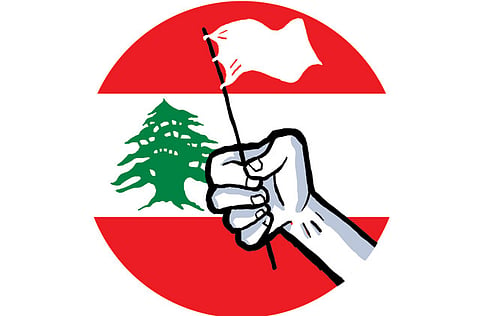Violence not an option for Lebanon
Indictments will not split Hariri's government because alternative will probably see the return of the Syrian Army

Although Iran's supreme leader Ayatollah Ali Khamenei dismissed as "null and void" a forthcoming ruling by the UN Security Council anointed Special Tribunal for Lebanon (STL), chances are excellent that the Lebanese will accept its rendering(s), with courage.
While many are calling on Prime Minister Sa'ad Hariri to respond positively to Hezbollah's demands to end cooperation with the STL, perhaps even obstruct what they label as a US-Israeli plan to instigate strife among the Lebanese, all parties, including Hezbollah, understand that the probe into the murder of former Lebanese prime minister Rafik Hariri, 22 of his companions, dozens of other Lebanese officials, as well as ordinary people caught in the country's violent environment, cannot be stopped.
What are subject to negotiations were responses to said decision(s) that may be masked as forms "of disobedience against state institutions." Palpable fears that renewed violence in Lebanon would quickly spillover abound — presumably not a desired option — which explains the cavalcade of high-level meetings among notable actors.
On December 8, Syrian President Bashar Al Assad visited Paris where French President Nicolas Sarkozy extended a particularly warm welcome at the Elysee Palace, even if the discussions were especially unfriendly. In fact, a diplomatic source confirmed that Al Assad insisted that Paris should not ask him to put pressure on Hezbollah.
Sarkozy allegedly responded by asserting his commitment to the tribunal, authorised the disbursement of France's monetary contribution to the STL budget and, in an unprecedented French move, agreed to donate 100 HOT anti-tank missiles to the Lebanese Army when Al Assad suggested that the Syrian Army could easily restore order in Lebanon.
The sum total of these measures highlighted sharp disagreements with Damascus although Al Assad left Paris after he declared that Syria would accept an indictment based on clear-cut evidence. Importantly, this was as lucid an expression of support for the STL as any, given that no international tribunal would even venture to point the finger at killers without proof.
Valuable progress
Still, it was within such troubling diplomatic manoeuvrings that Al Assad flew next to Doha, to seek assistance from the generally friendly Qatari Emir Shaikh Hamad Bin Khalifa Al Thani. Shaikh Hamad contended that Syria and Saudi Arabia were making valuable progress on defusing internal Lebanese tensions, which effectively ruled out a joint Syrian-Qatari proposal. What he offered to do, on the other hand, was to meet with Ayatollah Khamenei to lower regional tensions.
In the event, diplomatic sources confirmed that the Iranian-Qatari Summit was exceptionally difficult, and Shaikh Hamad clarified that while "some [sought] to create a new sedition in Lebanon, … [he was] trying to avoid this sedition with the help of regional countries." Presumably, Doha asked Tehran to tame its Lebanese proxies, fearing that an escalation would spillover into the Gulf region and rekindle the spectre of Sunni-Shiite friction.
Notwithstanding such contentions, considerable positive changes were recently recorded on the domestic Lebanese scene, starting with a dramatic shift among Hezbollah spokesmen.
Mohammad Ra'ad, for example, changed his high-pitched rhetoric though his colourful references to fellow citizens as children were permanently etched in the country's encyclopedia of the absurd.
Even the leading Hezbollah Member of Parliament realised how counterproductive and infantile such arguments were. More clairvoyant, Amal Party official and Minister of Health Mohammad Khalifa assured that no discord was in the making, emphasising that the Syrian-Saudi mediation was far more advanced than many assumed. The erudite and affable Khalifa stressed that no one from his side of the aisle would resort to force whatever indictments were handed down.
The beauty of Lebanon was that everyone could be as steadfast as necessary for no one was afraid and no one was ready to give a single inch of his sovereignty. Of course, and regrettably, some officials threatened to cut off hands and tongues, without realising that such methods seldom worked in a place where the other fellow was willing and able to reciprocate.
In fact, several clashes over the years, not just in the 20th century, led the wise former prime minister Saib Salam to devise his "no victor, no vanquished" [la ghalib la maghlub] formula, which was the best solution for the country.
As one of the founders of MEA (Middle East Airlines), Saib Bey used to describe Lebanon as a plane, whose two wings [one for the Christian community and the other for the Muslim community] were necessary for the aircraft to fly. No one has come up with a better resolution to date.
It is now understood by every sane observer that nothing and no one can stop the STL from issuing its indictment(s). No "null and void," or ad-nauseam repetitions that the STL is "dead and buried," will make an iota of difference. Few ought to rely on divine interventions to stop the STL from plowing ahead.
Beirut may well be paralysed for a while, with businesses at a standstill and the potential for bloody skirmishes looming over the horizon, although chances are excellent that the awaited indictments will not split Hariri's unity government, because the alternative is truly ugly and will probably see the return of the Syrian Army into Lebanon. No one is eager for that. Not even Hezbollah.
Dr Joseph A. Kechichian is a commentator and author of several books on Gulf affairs.



